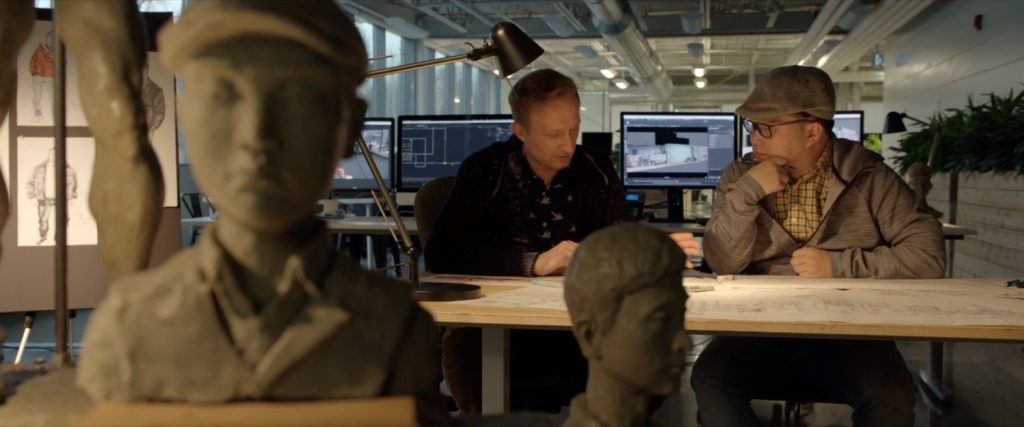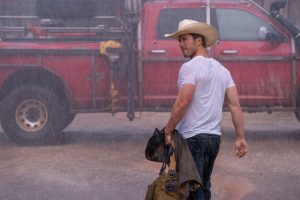Reviews include Deadpool & Wolverine, Doubles, and Mountain Queen: The Summits of Lhakpa Sherpa.
TFCA Friday: Week of Sept. 23
September 23, 2022

Welcome to TFCA Friday, a weekly round-up of film reviews and articles by TFCA members.
This week in movies!
223 Wick (dir. Sergio Myers)
“ Nothing really fresh in director Myers’ delivery of the standard tale, a religious horror film with cheap special effects that don’t really work or look scary and a conclusion all too predictable, despite the attempt at a twist at the end,” admits Gilbert Seah at Afro Toronto.
Bandit (dir. Allan Unger 🇨🇦)
“The film simply takes it as a given that a lightweight slab of handsome like Duhamel, with cocked eyebrows and a fast patter, is heroic enough material,” writes Liam Lacey at Original Cin. “There are token attempts at the character’s backstory (a rough home life, Reagan in the White House, a depressing job market). But mostly, he’s a fun guy who uses a gun to steal people’s money.”
“Bandit is a slightly overlong over 2 hour account of the flying bank robber, tackling often too many different topics that it can chew,” notes Gilbert Seah at Afro Toronto. “But the film is entertaining enough within its different parts to succeed.”
“Galavan’s incredible story is comic and cautionary, with weird rebel tongue-in-cheek glee and honestly, you can’t help but like the guy,” admits Anne Brodie at What She Said. “A grizzled and grey Gibson gives a strong performance in his few moments onscreen.”
“Toronto director Allan Ungar (Gridlocked) keeps the pace fast and light; despite a two-hour running time, the film never lags,” says Chris Knight at the National Post. “With cheeky voiceover narration by Duhamel, Bandit opens with one of Whiteman’s more daring robberies, a daylight raid on a London (Ontario) bank with Whiteman escaping in plain sight, dressed for a Shriner’s convention.”
Blonde (dir. Andrew Dominik)
“Armas…rises to the challenge superbly and makes me inclined to give the movie a pass on the basis of her performance alone,” says Peter Howell at the Toronto Star. “She resembles and moves like Monroe enough that in scenes recreating some of the star’s most famous moments — such as the ‘Diamonds Are a Girl’s Best Friend’ number from Gentlemen Prefer Blondes and the subway-grate ‘flying skirt’ PR stunt for The Seven Year Itch — it’s hard to tell the icon from the actor.”
“Melodrama becomes painfully lifelike and a suitable style to address the insatiable world Marilyn was forced to occupy,” notes Anne Brodie at What She Said. “Blonde is as over the top and lurid as Marilyn’s image, just what the people demanded of her.”
“[S]omewhere within its bum-numbing 166-minute running time, it becomes sadly, abundantly clear that writer-director Andrew Dominik’s much-hyped and visually arresting Blonde — based on the fictional novel of the same name about Marilyn Monroe by Joyce Carol Oates— is more Jobs than Walk the Line with a smidge of Showgirls tossed in,” observes Kim Hughes at Original Cin. “Which is too bad, because Ana de Armas is magnificent as Norma Jean, her every expression and movement embodying the late star and suggesting countless hours of research and rehearsal.
“At its best moments, though, Dominik’s confrontational aesthetics meld perfectly with the fierce performances of his cast, starting with a powerful de Armas, who never once lets the many iterations of her character get away from her control,” declares Barry Hertz at The Globe and Mail. “But Adrien Brody (playing Arthur Miller, here only named ‘The Playwright’) and Bobby Cannavale (Joe DiMaggio, or ‘The Ex-Athlete’) also make surprisingly lasting impressions, with the former finding a disturbing through-line of delusion in his devotion to Marilyn, and the latter pummelling the screen with a brutishness that is primal, revolting, unforgettable.”
“De Armas gets everything right: the wide-open eyes, the pure sexuality, the breathy voice, the uninhibited gaze that marks Marilyn,” observes Marc Glassman at Classical FM. “It’s uncanny and so is she: one never doubts that this is the duo persona of Norma Jeane, the lonely girl, and Marilyn, the sexiest thing on the planet. Nor do we ever lose both the iconic power of Marilyn in the film and de Armas as she reveals herself as a superstar performer and burgeoning legend.”
Buried (dir. Jared Drake and Steven Siig)
“Buried is more a film about the human spirit rather than the rescue or avalanches,” Gilbert Seah at Afro Toronto. “It is a well-made all round doc covering all the angles while concentrating on the correct subject core – the mental and health of the survivors.”
Don’t Worry Darling (dir. Olivia Wilde)
“Pugh’s emphatic acting helps paper over the cracks and chasms of the story; she’s an expressive performer even in the most absurd of circumstances,” writes Peter Howell at the Toronto Star. “Styles, in his first major movie role, is less of a fascination but then, so is his character, Jack. As for Pine, he gives good smirk as the sinister Frank.”
“Don’t Worry Darling is ultimately a puzzle in which not all the pieces fit together neatly, and those that do create a picture you may feel you’ve seen before,” notes Chris Knight at the National Post. “ It’s a 10-kilogram bag filled with five kilos of good ideas. Those earth tremors might just be the sound of them rattling around in a space that’s too big for them.”
“Well, let’s say there’s something to be said for low expectations,” admits Jim Slotek at Original Cin. “If it’s not original ground, Don’t Worry Darling is a visually arresting mash-up of The Stepford Wives and Pleasantville, with its plot about an idyllic artificial ‘50s with pampered suburban housewives religiously dedicated to their husbands and their cocktails, and hints of the decade’s dark side.”
“Director Wilde goes for style instead of substance,” sighs Gilbert Seah at Afro Toronto.
The Enforcer (dir. James Fargo)
“Lots of blood, rage, bad folks, and a high body count including 2 Chainz as a sex trafficker. A cautionary tale in which no one wins,” winces Anne Brodie at What She Said.
Eternal Spring (dir. Jason Loftus 🇨🇦)
“It plays out like a great heist thriller, with characters like ‘Mr. White’ and ‘Big Truck’ gathering to plan their TV takeover,” raves Chris Knight at the National Post. “It’s exciting, but never are we allowed to forget that this not fiction. Real lives are at stake, and many were lost.”
“Animation can be an extremely powerful tool in film storytelling. Eternal Spring, Canada’s submission for the 2023 Oscars in the Best International Feature Film category marries animation and live-action to great effect,” writes Anne Brodie at What She Said. “Loftus and Daxiong’s work is profoundly moving and without a doubt, Oscar-worthy.”
“What’s astonishing about Eternal Spring beyond its arresting and devastating content, is the apparently casual way that Loftus and company have created a film that uses documentary elements—Daxiong’s present day story—with animation, which evokes the exciting Falun Gong events in 2002 China,” writes Marc Glassman at Classical FM. “We move back and forth from live action to animation and from past to present seamlessly throughout the film. From docs to animation and back—Eternal Spring shows that it’s all storytelling.”
“Though the emotional appeal of this story of resistance to brutal repression is genuinely moving, the documentary has limitations in both style and content,” observes Liam Lacey at Original Cin. “Reconstructed memory from multiple sources is unavoidably elliptical, and Eternal Spring is particularly frustrating to follow. The narrative hopscotches around a 20-year-old event, the hijacking of a Chinese television broadcast by members of the Falun Gong on March 5, 2002.”
“Long persecuted in their homeland, Falun Gong practitioners were beaten and jailed in 2002 after hijacking a government TV signal to broadcast facts about their beliefs, which centre on meditation, exercise, truthful expression and benevolent behaviour,” writes Peter Howell at Night Vision. “Jason Loftus and illustrator Daxiong (who was part of the protest, now living in Toronto) combine potent recollections with gorgeous animation, in this #HotDocs22 audience winner.”
“Eternal Spring artfully articulates a people’s hunger for change,” writes Pat Mullen at POV Magazine. Mullen also speaks with director Jason Loftus and learns about his process with artist Daxiong. “Daxiong is our point of view. We face these events—a dramatic hijacking of the state TV airwaves—and see very real human rights consequences as a result,” says Loftus. “We see Daxiong processing it and interpreting it through his artwork. Through that, we see how art helps us to gain a new understanding of an event and perhaps provide some catharsis.”
God’s Country (dir. Julian Higgins)
“Racism, sexism, abuse, mental illness, duplicitous authorities and neighbours, and the natural end of out-of-control situations frame this quiet, gutsy portrait of a brave woman. Newton’s phenomenal control is reason alone to catch God’s Country,” advises Anne Brodie at What She Said.
“There’s righteous ferocity from Thandiwe Newton, who delivers a career-peak performance as a fearless college professor in red state back country,” notes Peter Howell at the Toronto Star. “All she wants to do is live quietly in her woodland cottage…Julian Higgins’ auspicious feature debut employs genre violence to make social revolution explosively real.”
Hunther (dir. Aleshia Cowser Jackson)
“Hunther, despite some tense moments, serves nothing new in a time water of a horror slasher flick,” admits Gilbert Seah at Afro Toronto.
A Jazzman’s Blues (dir. Tyler Perry)
At the Toronto Star, Marriska Fernandes chats with director Tyler Perry, who looks back on his career and experience that led him to revisit a screenplay he wrote years ago: “I don’t even want to imagine it because I think it took all of these years of experience of camera work, of being behind the camera and in front of the camera, to understand how to visually make it look like what I felt or saw in my mind when I was writing it,” Perry tells Fernandes. “[W]e’ve all experienced it at one point or another … unrequited love or love that ended badly or love that worked. So love is the thing that everybody wants at some point.”
“Perry has created in his first serious feature a lively excellently shot period atmospheric piece with a great jazz score that should be seen to be believed,” exclaims Gilbert Seah at Afro Toronto.
“Heartbroken Bayou finds work as a headliner in Chicago as his resentful, addicted brother looks on,” notes Anne Brodie at What She Said. “The danger comes in many diverse forms, some shaped by the times, some by jealousy and despair, and all of it tainted by Jim Crow attitudes. Perry’s provocative film powerfully reminds us these issues still hurt and undermine American culture.”
https://www.youtube.com/watch?v=5B7AXY4xXyQ
On the Come Up (dir. Sanaa Latham)
Marriska Fernandes speaks with director Sanaa Latham for the Toronto Star and learns how the actor went from Love & Basketball to her recent TIFF hit that features echoes from her own life: “My childhood had its challenges and, at around 15, I joined a youth theatre group in downtown New York. It became a channel for all of that angst and it was healing for me … Bri is very familiar to me in terms of my childhood and being raised by a community of strong women who are also vastly different. So that and then the love of music and the love of language, it was just kind of the perfect storm.”
Raven’s Hollow (dir. Christopher Hatton)
“Despite its promising beginning, Hatton’s film gets progressively both more ambitious and muddled during its second half leaving its rich atmospheric period setting as the film’s main attraction,” says Gilbert Seat at Afro Toronto.
Sidney (dir. Reginald Hudlin)
“He was told he’d never make it but determined to return one day as a movie star,” says Anne Brodie at What She Said. “Poiter along with a who’s who of stars, tells his story, and what a natural storyteller he was! And what stories. Reginald Hudlin directs this loving doc.”
“Sidney is a solid and exhaustive biopic of a great actor and human being, Sidney Poitier with many lessons to be learnt on the hard work that is demanded in order to be a success,” notes Gilbert Seah at Afro Toronto.
“Everyone adored Poitier, including his children and his first wife, who might have had some axes to grind but instead appears here like everyone else: in awe, and not a tiny bit smitten,” writes Kim Hughes at Original Cin. “Poitier died in January, age 94. Legacies don’t come more dazzling. Sidney is a fitting tribute.”
“Sidney offers a master class in screen acting as it unpacks Poitier’s filmography,” says Pat Mullen at POV Magazine. “Some of Poitier’s films haven’t aged well, largely because of the patronizing manner in which Hollywood depicted Black lives. The interviewees are willing to confront the films’ shortcomings to illustrate the work that’s still being done today.”
To the Moon (dir. Scott Friend)
“Despite its general weird atmosphere, contains a few but well executed tender moments,” writes Gilbert Seah at Afro Toronto.
True Things (dir. Harry Wootliff)
“Though True Things is far from a comedy, it has light moments, in particular, Blond’s macho bravado, which is almost comic, a low-rent coxcomb,” notes Liam Lacey at Original Cin. “But it’s also a drama that reflects the repetitious grind of a bad relationship. After a series of repeated episodes where Blond lets Kate down, dominates and humiliates her, he makes a kind of commitment to win her back, inviting her to Malaga, Spain for his sister’s wedding.”
A Festival of Festival Coverage: That’s a Wrap for TIFF!
In case you missed it, check out our member poll for the top picks of the festival.
At the Toronto Star, Peter Howell picks the best films of TIFF, including the People’s choice, The Fabelmans: “Steven Spielberg phones home … and truly connects,” writes Howell. “His family memory project, examining the cause of his parents’ divorce and his early filmmaking spark as a kid and teen in the 1950s to ’60s, is a movie of art and heart that’s sure to resonate with cinema lovers and awards bestowers everywhere.”
At The Globe and Mail, Barry Hertz recaps the good, the bad, and the Ticketmaster of TIFF ’22: “To start, there could be an entire miniseries made about how TIFF has gradually pushed its audience toward waging guerrilla warfare against Ticketmaster,” writes Hertz, noting that TIFF sort of rebounded with some sure-fire studio hits. “And yet: If TIFF wants to retain its self-made reputation as the unofficial launching pad of Oscar winners – as the home for both the best and most popular cinema – then there is some serious work to be done.”
Also at The Globe and Mail, Barry Hertz chats with the man who was “chest in show” at TIFF this year, Canadian actor Luke Macfarlane as the hunky heartthrob of Bros: “My character in Bros has to look a certain way in order to move in society and have status,” Macfarlane tells Hertz. “Looks are certainly a part of it. And I do think about the opportunities I’ve had to be the action star and how they’ve passed me by. I was lucky enough to do 50 episodes of Killjoys, but would that have been my time to do a Marvel movie? I don’t know.”
Whodunit? Who cares! Nathalie Atkinson at Zoomer looks at the latest star-studded murder mystery revival ushered in by Knives Out and its TIFF hit Glass Onion: “Like the bestselling British author who’s been dubbed Christie’s heir apparent, Johnson wears the Agatha Christie influence proudly,” writes Atkinson. “‘Every single time, she found a way into it that felt unique and fresh,’ he said admiringly of the Queen of Crime in a recent interview, ‘and you could tell it was challenging her creatively.’”
At Afro Toronto, Gilbert Seah picks his top ten of TIFF based on the whopping 83 films he saw. At #1? Triangle of Sadness: “There is the 99% of the less wealthy audience who would cheer to see the undeserving rich and wealthy get their comeuppance and also hopefully the other 1% of the audience as represented by the yacht’s passengers who are able to laugh at themselves.”
At Original Cin, the team picks the highs and lows of the festival: “multiple heavyweight films directed by women, the Indigenous experience spotlighted and considered, tiny foreign and independent films elevated, and marquee films ushered into awards seasons with giddy advance buzz. And really, it feels so wonderfully decadent to be watching a film in the middle of the day, doesn’t it?”
At Zoomer, Johanna Schneller speaks with The Woman King star Viola Davis on the long fight of getting the film made and to its launch at the festival: “There are no words to quantify what that fight is,” Davis tells Schneller. “Every time I walked into a meeting, I was hustling for my worth. Fighting for what we look like. ‘Can you make them prettier?’ ‘Can we have more lipstick and not dirt?’ Fighting for these actors, who are, come on, frigging great, but they don’t have the resumes of their white counterparts.”
At That Shelf, Jason Gorber, Courtney Small, Victor Stiff, and Pat Mullen join other writers in a TIFF round-table to discuss hidden gems like Hawa, the controversy of The People’s Joker, authenticity in My Policeman and Bros, and a little movie called The Fabelmans.
At Exclaim!, Rachel Ho recaps the best of TIFF, including Clement Virgo’s Brother: “This story of two brothers growing up in the Toronto neighbourhood of Scarborough in the 1990s is a moving film that explores the humanity behind grief. Director Clement Virgo goes deep into the thick of the desire to do more with life than society permits, resulting in one of the most deeply felt films of the year.”
At the Toronto Star, Marriska Fernandes speaks with the Pearl team and gets some thoughts from director Ti West and star Mia Goth on revisiting a character so quickly after this year’s slasher X: “It just felt like a real gift to have the opportunity to spend so much time with one character,” Goth tells Fernandes. “Perhaps if you do a TV show or series, you can kind of revisit the character and see what their arc might be. But this was definitely a first for me and there was just so much there to kind of sink your teeth into.”
At Zoomer, Marriska Fernandes interviews Moonage Daydream director Brett Morgen about his doc on David Bowie and learns how the star continues to resonate: “Bowie was one of the first artists in pop culture to sort of announce that our differences were to be celebrated — that what made us different was our strength and our superpower,” notes Morgen. “And by announcing that he made us recognize and feel that we were not alone, that it was okay to be not what your parents wanted you to be. And in the days before the internet, there really weren’t a lot of poster children for what that messaging.”
At POV Magazine, Pat Mullen recaps the TIFF Docs line-up where Laura Poitras was the MVP with Golden Lion winner All the Beauty and the Bloodshed. “The film taps into the unease of the ever-widening rich/poor gap, and the social inequalities that have exploded during the pandemic,” writes Mullen. “The doc’s finale in which Goldin shares her impact statement to the Sacklers via an impersonal Zoom call feels appropriately cold as the family observes uninterested and unmoved. Bloodshed is Poitras’ best work yet, and arguably one of the clear awards season frontrunners to emerge from the festival.”
At That Shelf, Pat Mullen surveys TIFF’s Platform Competition where Riceboy Sleeps won and How to Blow Up a Pipeline blew the roof off festival screenings: “The TIFF Platform competition delivered one of the breakout films of the festival with the thrilling environmental white-knuckler How to Blow Up a Pipeline. Director Daniel Goldhaber doesn’t waste a single frame in this perfectly crafted parable of radical protest.”
2020 Emerging Critic Rose Ho reports on the festival highlights, including Corsage, The Banshees of Inisherin, and that dang Bulgari ad. “Truthfully, there’s only so many times someone can endure seeing Anne Hathaway and Zendaya bedecked in massive diamonds, emeralds, rubies, and sapphires, and the rounds of clapping showed how many people in the audience were also cramming in as many movies as they could,” writes Ho. “Whatever idiosyncrasies crop up, I look forward to going back next year and experiencing TIFF all over again!”
TV Talk/Series Scribbles
At What She Said, Anne Brodie reports on the showbiz series Reboot, calling it a “terrifically entertaining, juicy backstage series that aims to be ultra-modern but certainly brings to mind those wonderful backstage stories from Hollywood’s past.” Great Lakes Untamed, meanwhile, is a “beautifully produced, striking series” about the Great Lakes. The return of Murdoch Mysteries, on the other hand, “continues to rise to the occasion of creativity, imagination, and the love of history.”



